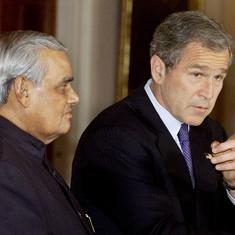Did a school drop-out in colonial-era India fly the world’s first plane in 1895, eight years before the Wright brothers, on the strength of indigenously sourced metal and fuel, home-grown intelligence, conviction, crowd-sourcing and anti-British sentiment?
The brutally short answer to that question can be found in textbooks, but Hawaizaada director Vibhu Puri doesn’t allow the absence of scientific proof to dent his enthusiasm. Citing passages and verses from ancient Hindu texts such as the Vedas and the Puranas, Puri lets his imagination soar. He dreams of a scenario in which Shivkar Talpade (Ayushmann Khurana), acting on the instructions of his mentor Subbaraya Shastri (Mithun Chakraborty), operates a plane that takes off from Girgaum Chowpatty in Mumbai, soars over the city and flies straight towards the sun, presumably to greet Icarus.
Hawaizaada would have worked nicely as a work of fiction about two individuals who dream of putting the allegories and myths on which they grew up into practice, but Puri wholly believes in his flight of fancy. Imbued with the spirit that drives Vedic science theorists and Make in India advocates, Puri rolls out the Vande Matarams and scriptural chants to support the thin possibility that the stagecoach-like contraption can actually hit the air, let alone move ahead a few metres.
Hawaizaada’s ultimate problem is not whether Shivkar actually flew or why we are watching a movie in 2015 that celebrates mumbo-jumbo when Indian scientists have real feats to celebrate, such as the Mars mission. The problem lies with Puri’s piloting skills. Hawaizaada has been made and shot with passion and care, but the use of sets and computer-generated imagery is obvious, taking the creation even further away from earth than it already is.
Much of the acting vacillates between sentimental and clownish. Khurana barely looks the part, Chakraborty hams as a cuddly old man, and Pallavi Sarada is underwhelming as Sitara, a dancer who steals away Shrikar’s heart for no reason other than to serve as a trigger for his actions. Meanwhile, a handful of buffoonish expatriates who never overcome their enthusiasm at being in a Hindi movie underline the average Indian filmmaker’s inability to direct a colonial-era movie with seriousness or rigour.
At 147 minutes, there are far too many songs, most of them bunched together in the never-ending third act, too much faith in the Shrikar-Shastri duo’s tall claims, and too much effort expended on chest-thumping. In its attempts to assuage Indian insecurities about being denied a seat at the high table, its repeated assertions that but for the imperialist, racist, Christian and capitalist West, India would have ruled the world, and its unblinking embrace of myth and allegory as fact, Hawaizaada is entirely of the moment.










